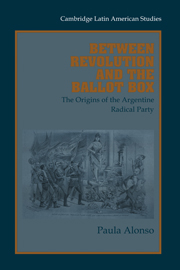Book contents
- Frontmatter
- Contents
- Acknowledgments
- List of Abbreviations
- List of Tables and Figures
- Introduction
- 1 The Political Arena
- 2 Mounting an Opposition
- 3 The Short-Lived Unión Cívica
- 4 The Radicals in Action: Part I
- 5 The Radicals in Action: Part II
- 6 The Decline of the Radical Party
- Conclusion
- Appendix 1 A Chronology of Political Parties and Factions, 1862–1910
- Appendix 2 Details of the Members of the National Committee of the UCR in 1892
- Appendix 3 Property Values in Buenos Aires, 1890–1898
- Bibliography
- Index
Conclusion
Published online by Cambridge University Press: 05 August 2011
- Frontmatter
- Contents
- Acknowledgments
- List of Abbreviations
- List of Tables and Figures
- Introduction
- 1 The Political Arena
- 2 Mounting an Opposition
- 3 The Short-Lived Unión Cívica
- 4 The Radicals in Action: Part I
- 5 The Radicals in Action: Part II
- 6 The Decline of the Radical Party
- Conclusion
- Appendix 1 A Chronology of Political Parties and Factions, 1862–1910
- Appendix 2 Details of the Members of the National Committee of the UCR in 1892
- Appendix 3 Property Values in Buenos Aires, 1890–1898
- Bibliography
- Index
Summary
The origins of the Argentine Radical Party have been studied from a variety of standpoints and various conclusions have been reached. The most fundamental conclusion is that the founding of the UCR merits close examination. This is not only because a detailed analysis of the Radical Party provides a clearer perception of political life of the last two decades of the nineteenth century and helps to revise the standard conceptions about the UCR, but also because the birth of the Radical Party had a decisive impact on the politics of the 1890s and a long-lasting effect on Argentina's political culture and party system.
The objective of the present work has been to provide a comprehensive panorama of the events that led to the formation of the UCR and a different perspective on Argentine politics of the 1890s. It has been argued that the Radical Party was mainly (though not exclusively) a revolutionary party that emerged in the 1890s after a series of complex political events. Clashes of ideology, of factions, and of personalities were the crucible in which it was formed. The UCR leaders saw themselves as both revolutionaries and conservatives – terms that acquire their full meaning only in the political context of the time.
The UCR was founded after ten years of political consolidation by the PAN, a party determined to leave behind the “era of political convulsions” and to inaugurate one of “order and progress.”
- Type
- Chapter
- Information
- Between Revolution and the Ballot BoxThe Origins of the Argentine Radical Party in the 1890s, pp. 205 - 214Publisher: Cambridge University PressPrint publication year: 2000

